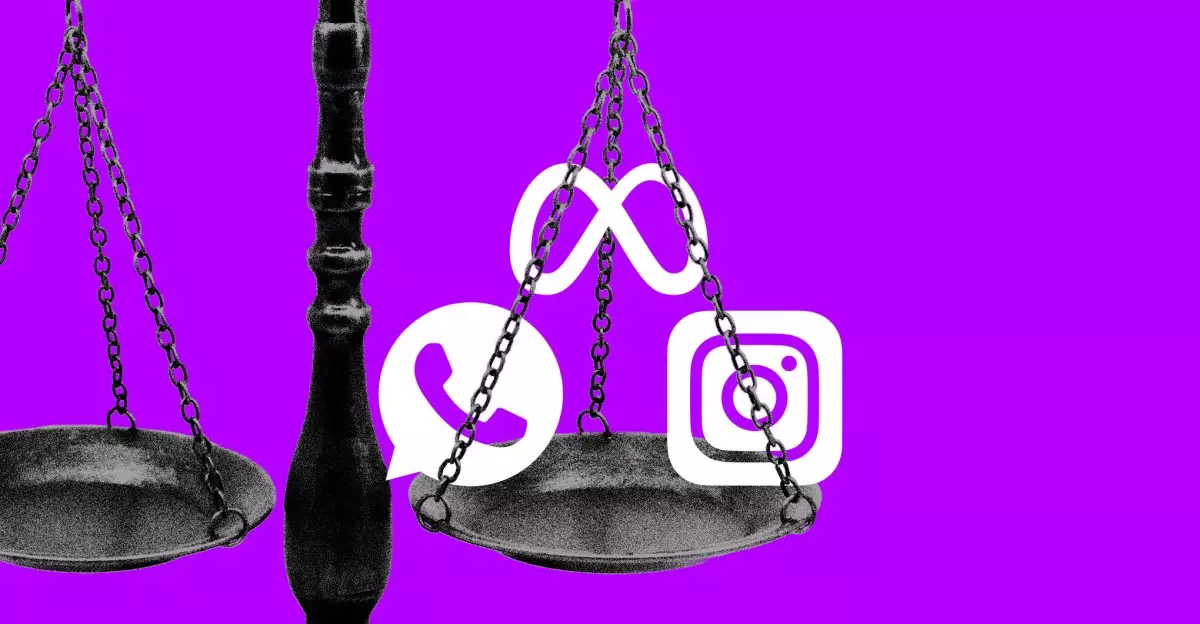The recent FTC v. Meta trial has thrust CEO Mark Zuckerberg into the spotlight, illuminating the complex tensions between innovation and regulation in the tech industry. As the trial navigates the tumultuous waters of antitrust law, it’s essential to scrutinize not just the arguments presented, but also the broader implications of these corporate maneuvers. Zuckerberg’s responses during his extensive testimony serve as a window into the psyche of a leader who is not only battling accusations but also defending a vision of what social communications could and should look like.
Zuckerberg faced allegations that his acquisition of WhatsApp and Instagram was premeditated, aimed at eliminating potential threats to Facebook’s dominance rather than fostering innovation. This accusation stirs a debate about the ethical boundaries of competition, a conversation increasingly relevant in an age where tech giants influence nearly every aspect of daily life.
The Acquisition Debate: Investment or Extinction?
During the trial, a particularly telling moment emerged when Zuckerberg expressed unwavering satisfaction with the $19 billion purchase of WhatsApp. “I’d do it again,” he declared, even amidst intense scrutiny. This perspective reflects a crucial point: the acquisitions were strategic investments aimed at capturing the shifting landscape of communication. Rather than viewing these apps as mere tools to stifle competition, Zuckerberg framed them as integral to Facebook’s evolution in an increasingly private and fragmented digital space.
The government’s argument hinges on the assertion that Zuckerberg’s strategy constituted a “catch-and-kill” method aimed at extinguishing rivals. Yet, juxtaposing this with Zuckerberg’s testimony reveals a nuanced narrative. His insistence that WhatsApp’s co-founders held disdain for social media points toward an essential truth: their vision did not align with that of Facebook. Zuckerberg’s claim about having to actively encourage the introduction of social features in WhatsApp challenges the idea that he sought to eliminate competition through acquisition. Instead, it prompts a deeper inquiry into how businesses navigate collaboration and innovation under the pressures of potential rivalry.
Zuckerberg’s Vision: Emphasizing Growth over Competition
Zuckerberg articulated a belief that the rise of WhatsApp signified a shift in user behavior toward private communications rather than public social sharing, which was dominating at the time. His willingness to pay a record sum for a messaging platform was predicated on an understanding of emerging trends: the migration towards private messaging was not merely a fad but a precursor to broad-based societal change in how we communicate.
Interestingly, Zuckerberg portrayed the acquisition as a necessary step for Facebook to navigate a world dominated by competitors like Apple and Google, companies he viewed as constant threats. He noted the necessity of having leverage in negotiations regarding distribution in app stores. This insight pushes the narrative away from malintent towards a more complex depiction of corporate strategy in a landscape where maintaining power and negotiating terms are tantamount to survival.
The Rise of Instagram: An Unexpected Investment
More compelling was Zuckerberg’s retrospective on the Instagram acquisition. Originally viewed as a potential competitor, Instagram evolved dramatically with Facebook’s backing, ballooning from a mere 10 million users to over 2 billion. Zuckerberg attributed this success to the resources allocated to Instagram to combat spam and enhance user engagement. His assertion that Instagram’s success may not have been attainable without Facebook’s intervention raises questions about the interdependencies within the tech ecosystem and what true competition looks like in this era.
Zuckerberg’s admission that he was not initially concerned about Instagram siphoning users from Facebook until it reached a significant user base speaks volumes about long-term strategic foresight. He noted how quickly things can change; once he recognized Instagram’s potential, he pivoted to ensure it grew to new heights, further solidifying his view that acquisitions can stimulate growth rather than simply eliminate competition.
A Reflection on Corporate Ethics and Future Implications
As Zuckerberg’s testimony unfolded, it began to paint a picture of a tech leader who, despite being cast in the role of a monopolist, was actually navigating a treacherous landscape filled with evolving user expectations and fierce competition. The nuances of his arguments provoke a needed conversation about ethical corporate governance and the responsibilities tech leaders bear in shaping the future.
With former Meta COO Sheryl Sandberg involved and publicly admitting to a misjudgment about the value of Instagram, the trial transcends mere legal discourse. It challenges industry insiders and observers alike to reflect on what constitutes fair play in an industry marked by rapid advances and shifting paradigms.
This court trial is not merely a judicial process—it is a landmark examination of how corporations can influence societal trends under the guise of competition, forcing leaders to reckon with the ramifications of their decisions on innovation and public trust in the digital age. The outcome of this trial could set a precedent that shapes not only the future of Meta but the entire tech landscape moving forward.

